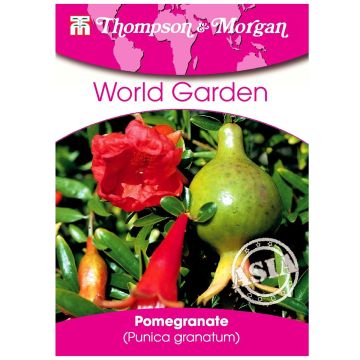

Graines de Mirabilis jalapa Marbles Mix - Belle-de-nuit en mélange
Mirabilis jalapa Marbles Mix - seeds
Mirabilis jalapa Marbles Mix
Four O'Clock Flower, Marvel of Peru
No comment yet as not sown it.
Nath44, 18/09/2024
This item cannot be shipped to the selected country
Dispatch by letter from €3.90
More information
Schedule delivery date,
and select date in basket
This plant carries a 6 months recovery warranty
More information
We guarantee the quality of our plants for a full growing cycle, and will replace at our expense any plant that fails to recover under normal climatic and planting conditions.
Seed-only orders are dispatched by sealed envelope. The delivery charge for seed-only orders is €3.90.

Does this plant fit my garden?
Set up your Plantfit profile →
Description
Vigorous seedlings will grow from the large black seeds of these four o'clock flowers, also known as Mirabilis jalapa Marbles mix, and form a lush, well-branched bush in just three months. The bush has glossy green foliage and is crowned with trumpet-shaped flowers in a wide range of colours. Each flower is randomly splashed with cherry red. These incredible flowers open in the late afternoon, releasing a sweet fragrance, and close again when they are hit by the sun. These tender perennials are easy to sow and grow and are often treated as annuals. They thrive in fertile, moist soils and prefer a sunny position to semi-shady in warm climates.
Mirabilis jalapa, also known as Marvel of Peru, is a herbaceous perennial plant in the Nyctaginaceae family, native to dry tropical regions of Central and South America, such as Guatemala, Mexico, Chile, and Peru. It develops a large, black, tuberous root, which has traditional medicinal uses in various parts of the world. Four o'clock flowers are herbaceous perennials that grow to 80 cm (32in) high, sometimes more, and occupy a ground surface of 40 to 60 cm (16 to 24in). They are not very hardy, but their fast growth allows them to be grown as annuals. In our climates, they disappear in winter and bloom from June to October, but in the tropics, they are perennial and bloom all year round. The 'Marbles' selection is distinguished by the surprising colouration of its trumpet-shaped flowers: on a background of yellow, pink, magenta red, white, or bright pink, there are splashes or streaks of cherry red. Some flowers appear perfectly bicoloured. Like the wild species, the flowers open in the evening and close the next day when the sun hits them. They emit a sweet fragrance from dusk until the middle of the night. This particular characteristic has given the plant its common name of the Four o'clock flower. Its fragrant flowers have fluorescent pigments that create patterns on the corolla and attract pollinating moths. The black fruit appears at the base of the flower once it has fallen. The green to reddish stems are solid, quadrangular, fleshy and thickened at the nodes and bear opposite, ovate leaves with rounded or slightly heart-shaped bases. The leaves are glossy medium green, lighter on chalky soil and in full sun.
Four o'clock flowers can be used in mass plantings with roses, for example, at the base of walls exposed to the east or south for a large part of the growing season. They also grow very well in large, deep pots, with regular watering and fertiliser. They can be grown like dahlias, and their tubers can be overwintered frost-free in a sandy mix.
Report an error about the product description
Flowering
Foliage
Plant habit
Botanical data
Mirabilis
jalapa
Marbles Mix
Nyctaginaceae
Four O'Clock Flower, Marvel of Peru
South America
Other Mirabilis seeds
Planting and care
Sowing:
Sowing Mirabilis seeds is very easy:
Sow your seeds from February to May, at 18-20°C (64.4-68°F) by lightly pressing the seeds into moist and well-draining soil. Place the container in a propagator or a polythene bag until germination, which usually takes 7 to 21 days. Do not exclude light, as it aids germination.
Transplant the seedlings, when they are big enough to handle, into 8 cm (3in) pots and grow them in cooler conditions for at least 10-15 days before planting them outside. Plant them outdoors after the last frost, spacing them 40cm (16in) apart.
Mirabilis flowers 90 days after sowing.
Cultivation:
Mirabilis is an easy plant to grow, provided it is given a sheltered position away from strong winds, in a sunny or partially shaded area, especially if you in a region with hot summers. Under these conditions, it grows very quickly.
It prefers light, humus-rich, well-draining soils that remain moist in summer and are close to neutral pH. The more fertile the soil, the more the plant grow.
Growing in pots is also possible with a mix of 80% compost and 20% garden soil in a deep container.
This plant is sensitive to overwatering. In regions with cold winters, it should be dug up and the root stored frost-free, like cannas or dahlias.
Sowing period
Intended location
-
, onOrder confirmed
Reply from on Promesse de fleurs
Flower seeds
Haven't found what you were looking for?
Hardiness is the lowest winter temperature a plant can endure without suffering serious damage or even dying. However, hardiness is affected by location (a sheltered area, such as a patio), protection (winter cover) and soil type (hardiness is improved by well-drained soil).

Photo Sharing Terms & Conditions
In order to encourage gardeners to interact and share their experiences, Promesse de fleurs offers various media enabling content to be uploaded onto its Site - in particular via the ‘Photo sharing’ module.
The User agrees to refrain from:
- Posting any content that is illegal, prejudicial, insulting, racist, inciteful to hatred, revisionist, contrary to public decency, that infringes on privacy or on the privacy rights of third parties, in particular the publicity rights of persons and goods, intellectual property rights, or the right to privacy.
- Submitting content on behalf of a third party;
- Impersonate the identity of a third party and/or publish any personal information about a third party;
In general, the User undertakes to refrain from any unethical behaviour.
All Content (in particular text, comments, files, images, photos, videos, creative works, etc.), which may be subject to property or intellectual property rights, image or other private rights, shall remain the property of the User, subject to the limited rights granted by the terms of the licence granted by Promesse de fleurs as stated below. Users are at liberty to publish or not to publish such Content on the Site, notably via the ‘Photo Sharing’ facility, and accept that this Content shall be made public and freely accessible, notably on the Internet.
Users further acknowledge, undertake to have ,and guarantee that they hold all necessary rights and permissions to publish such material on the Site, in particular with regard to the legislation in force pertaining to any privacy, property, intellectual property, image, or contractual rights, or rights of any other nature. By publishing such Content on the Site, Users acknowledge accepting full liability as publishers of the Content within the meaning of the law, and grant Promesse de fleurs, free of charge, an inclusive, worldwide licence for the said Content for the entire duration of its publication, including all reproduction, representation, up/downloading, displaying, performing, transmission, and storage rights.
Users also grant permission for their name to be linked to the Content and accept that this link may not always be made available.
By engaging in posting material, Users consent to their Content becoming automatically accessible on the Internet, in particular on other sites and/or blogs and/or web pages of the Promesse de fleurs site, including in particular social pages and the Promesse de fleurs catalogue.
Users may secure the removal of entrusted content free of charge by issuing a simple request via our contact form.
The flowering period indicated on our website applies to countries and regions located in USDA zone 8 (France, the United Kingdom, Ireland, the Netherlands, etc.)
It will vary according to where you live:
- In zones 9 to 10 (Italy, Spain, Greece, etc.), flowering will occur about 2 to 4 weeks earlier.
- In zones 6 to 7 (Germany, Poland, Slovenia, and lower mountainous regions), flowering will be delayed by 2 to 3 weeks.
- In zone 5 (Central Europe, Scandinavia), blooming will be delayed by 3 to 5 weeks.
In temperate climates, pruning of spring-flowering shrubs (forsythia, spireas, etc.) should be done just after flowering.
Pruning of summer-flowering shrubs (Indian Lilac, Perovskia, etc.) can be done in winter or spring.
In cold regions as well as with frost-sensitive plants, avoid pruning too early when severe frosts may still occur.
The planting period indicated on our website applies to countries and regions located in USDA zone 8 (France, United Kingdom, Ireland, Netherlands).
It will vary according to where you live:
- In Mediterranean zones (Marseille, Madrid, Milan, etc.), autumn and winter are the best planting periods.
- In continental zones (Strasbourg, Munich, Vienna, etc.), delay planting by 2 to 3 weeks in spring and bring it forward by 2 to 4 weeks in autumn.
- In mountainous regions (the Alps, Pyrenees, Carpathians, etc.), it is best to plant in late spring (May-June) or late summer (August-September).
The harvesting period indicated on our website applies to countries and regions in USDA zone 8 (France, England, Ireland, the Netherlands).
In colder areas (Scandinavia, Poland, Austria...) fruit and vegetable harvests are likely to be delayed by 3-4 weeks.
In warmer areas (Italy, Spain, Greece, etc.), harvesting will probably take place earlier, depending on weather conditions.
The sowing periods indicated on our website apply to countries and regions within USDA Zone 8 (France, UK, Ireland, Netherlands).
In colder areas (Scandinavia, Poland, Austria...), delay any outdoor sowing by 3-4 weeks, or sow under glass.
In warmer climes (Italy, Spain, Greece, etc.), bring outdoor sowing forward by a few weeks.

















































